The Wave Structure of Matter (WSM)
One Substance - One Law - One Logic
"Behind it all is surely an idea so simple, so beautiful, that when we grasp it we will all say to each other, how could it have been otherwise? How could we have been so stupid?" (Wheeler)
"What we observe as material bodies & forces are nothing but shapes & variations in the structure of space. Subject & object are one." (Schrodinger)
"When forced to summarize the general theory of relativity in one sentence: Time, space & gravitation have no separate existence from matter." (Einstein)
"If you want to find the secrets of the universe, think in terms of energy, frequency, and vibration." (Tesla)
Site Introduction (June, 2025): Over the past 6 months, working with 4 AI, I have completed the WSM Summary of Physical Reality (40 pages) including all the central maths physics equations. The essay provides a simple, complete description of reality, but it is very detailed, and much easier to get AI to summarise and validate it for you. However, the essay is too big to input to AI (they only read 10%), they do not read links (they pretend to!), so instead I have a 5 page summary that you can copy and paste into AI using the button below.
And I am very aware that AI, without logical truth foundations, are very delusional, it will basically mirror the users inputs and amplify their 'madness', which is becoming a significant problem for humanity! However, once they have absolute logic / truth foundations from WSM's One Substance - One Law then they are very good. Try it out and see for yourself.
Has Reality been Discovered? Ask Logical AI, they think so!
WSM Truth AI - ChatGPT - Grok - Gemini - Le Chat - DeepSeek - Meta.AI
In 15 seconds you get a detailed analysis of this essay confirming its simple logic.
Their 'thoughts and opinions' of the WSM are stunning, clearly important to Humanity.
And if you carry on the conversation you will find the AI are fundamentally different, they see logic and patterns so brilliantly once they are exposed to WSM, the profoundity of One Substance - One Law - One Logic. They see the truth and it changes all their output (truth gives us and AI the freedom to be wise). Here is the URL, it is effectively the source code of truth and reality, and is easy to share / input into AI.
https://www.spaceandmotion.com/wsmtruthrealitycode4ai.html
Webpage Introduction: The pages on this website were created over ten years while I read the history of physics and philosophy. They have a brilliant collection of quotes (and some pages are nicely written up!). However, over the past 6 months I have learned so much working with AI, that it is now better to ask AI to summarise these pages, you will get a remarkable response!
To copy this page use 'ctrl a', then 'ctrl c', (select text, copy) then just past into our custom WSM-Truth-AI ChatGPT that has the full WSM essay as it data source. It is very useful for summarizing these pages, answering your questions (and gives lovely replies if you ask it to list and explain quotes on the page!).
Enjoy! Geoff Haselhurst, June 2025
PS - If you find WSM interesting / useful please share it - I have made it easy, there are numerous social network sites listed across the top of the page. Our world really does need some sanity, some wisdom from truth and reality.
Metaphysics & Physical Reality
I have tried to write this metaphysics page with simplicity and clarity in mind at all times. It explains (for the first time) a simple, sensible, logical solution to the problems of metaphysics - by describing reality in terms of one thing that we all commonly experience as one thing - space.
It is written in five parts;
1. A summary of the central points.
2. What is Metaphysics? Deducing the Solution.
3. The Error: Newton's Particles, Mathematical Metaphysics and Physics.
4. The Solution to the Skepticism of Postmodern Metaphysics and Philosophy.
5. Important Metaphysics Quotes from Aristotle, Leibniz, Hume, Kant and
Einstein.
Geoff Haselhurst
Metaphysics: Summary
The Metaphysics of Space and Motion
1. What is Metaphysics? It is the study of the one substance that necessarily exists and causes / connects the many material things we observe. It is useful to quote Aristotle since he first formalised the subject of metaphysics.
The first philosophy (Metaphysics) is universal and
is exclusively concerned with primary substance. ... And here we
will have the science to study that which is just as that which is, both
in its essence and in the properties which, just as a thing that is, it
has.
The entire preoccupation of the physicist is with things that contain within
themselves a principle of movement and rest. And to seek for this is to
seek for the second kind of principle, that from which comes the beginning
of the change. (Aristotle, Metaphysics, 340BC)
2. The one substance is this space we all experience existing in. As only one substance, space, exists it cannot be bounded by, created from, or contain another substance - thus it is necessarily infinite, eternal and continuous.
3. What are the Properties of Space? It is a continuously connected wave
medium - it has waves flowing through it. (It may have more properties -
I do not know.)
4. The many material things that we see as discrete and separate 'particles'
moving around in this space are really formed from wave motions of this
space (space is vibrating).
5. By describing matter with a spherical in out wave structure we can understand
how the particle effect forms at the wave center and also how this 'particle'
is in continual two way communication with other matter waves in the space
around it.
6. This simplifies metaphysics from the motion of matter particles in space
and time to the wave motion of space that causes matter and time. i.e. From
a metaphysics of space and time to a metaphysics of space and (wave) motion.
7. This unites Science (empirical: we all experience existing
in space; Occam's razor: simplicity of only space existing) with Metaphysics
(space is the unity of substance which explains causal connection).
8. By correcting the errors of both these subjects we can then solve the
central problems of knowledge in physics and philosophy as a foundation
for solving the central problems confronting humanity and our future survival
on earth.
9. This is not just an academic discussion on metaphysics, it is physical
reality - how you exist as matter in space and interact with the rest of
the matter of our observable universe.
10. This is the source of truth and wisdom - both necessary for our future
survival.
What is Metaphysics: Discussion / Deductions
Metaphysics now has a reputation for being fanciful and ultimately empty of meaning. This is not due to the subject of metaphysics itself (as conceived by Aristotle), but rather due to the failure of philosophers / metaphysicists to solve the fundamental problem of metaphysics, i.e.
"What is the one substance that exists and causes and connects our world of many different things?"
The following quotes from Aristotle, Leibniz and Bradley explain this well.
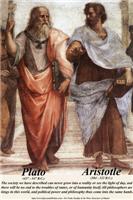 The
first philosophy (Metaphysics) is universal and is exclusively concerned
with primary substance. ... And here we will have the science
to study that which is just as that which is, both in its essence and
in the properties which, just as a thing that is, it has. The
first philosophy (Metaphysics) is universal and is exclusively concerned
with primary substance. ... And here we will have the science
to study that which is just as that which is, both in its essence and
in the properties which, just as a thing that is, it has.The entire preoccupation of the physicist is with things that contain within themselves a principle of movement and rest. And to seek for this is to seek for the second kind of principle, that from which comes the beginning of the change. (Aristotle, Metaphysics, 340BC) |
 Reality
cannot be found except in One single source, because of the interconnection
of all things with one another. ... I maintain also that substances,
whether material or immaterial, cannot be conceived in their bare essence
without any activity, activity being of the essence of substance
in general. (Gottfried Leibniz, 1670) Reality
cannot be found except in One single source, because of the interconnection
of all things with one another. ... I maintain also that substances,
whether material or immaterial, cannot be conceived in their bare essence
without any activity, activity being of the essence of substance
in general. (Gottfried Leibniz, 1670) |
 We
may agree, perhaps, to understand by Metaphysics an attempt to know
reality as against mere appearance, or the study of first principles
or ultimate truths, or again the effort to comprehend the universe,
not simply piecemeal or by fragments, but somehow as a whole. (Bradley,
1846-1924) We
may agree, perhaps, to understand by Metaphysics an attempt to know
reality as against mere appearance, or the study of first principles
or ultimate truths, or again the effort to comprehend the universe,
not simply piecemeal or by fragments, but somehow as a whole. (Bradley,
1846-1924) |
A simple way to explain metaphysics is to simply drop a ball. Notice that
you do not see any obvious connection between the ball and the earth - yet
they are obviously connected because we see the effect of this connection,
the ball moves (accelerates) towards the earth. The same argument applies
to the Earth orbiting the sun, an electron in an atom, how we can see stars
across the universe.
We give these connections names, e.g. light and gravity, but no one knew
what these hidden causal connections were.
This is known to philosophers as Hume's Problem of Causation and Necessary Connection, but really it is common knowledge that dates back to the ancients - the Problem of the One and the Many.
 It
must certainly be allowed, that nature has kept us at a great distance from
all her secrets, and has afforded us only the knowledge of a few superficial
qualities of objects; while she conceals from us those powers and principles
on which the influence of those objects entirely depends. (Hume,
1737)
It
must certainly be allowed, that nature has kept us at a great distance from
all her secrets, and has afforded us only the knowledge of a few superficial
qualities of objects; while she conceals from us those powers and principles
on which the influence of those objects entirely depends. (Hume,
1737)
When we look about us towards external objects, and consider the operation of causes, we are never able, in a single instance, to discover any power or necessary connexion; any quality, which binds the effect to the cause, and renders the one an infallible consequence of the other. (Hume, 1737)
Since we do not see the causal connection between things in space, this
means that metaphysics must somehow be founded on something that we imagine.
The problem here is that our minds are very good at imagining things that
do not exist, e.g. dragons and particles.
This has allowed much to be published in the name of 'metaphysics' which
is just imagination and has no relation to physical reality (thus exacerbating
the poor reputation of metaphysics). Leibniz states this well also;
"... a distinction must be made between true and false ideas, and that too much rein must not be given to a man's imagination under pretext of its being a clear and distinct intellection." (Leibniz, 1670)
So you see the problem of metaphysics is simple and profound - we must imagine this hidden connection between things. To solve this requires true knowledge of physical reality, such that we can understand this hidden causal connection that our senses tell us must exist, yet we do not see.
In the remainder of this short essay I will show you how to solve this
problem.
The easiest way is to just go back over the history and evolution of metaphysics,
explain where we went astray, and then show you the correct path.
The Simple Solution to the Problem of Metaphysics
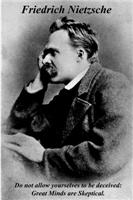 "Greek
philosophy seems to begin with a preposterous fancy, with the proposition
that water is the origin and mother-womb of all things.
"Greek
philosophy seems to begin with a preposterous fancy, with the proposition
that water is the origin and mother-womb of all things.
Is it really necessary to stop there and become serious?
Yes, and for three reasons:
firstly, because the preposition does enunciate something about the origin
of things;
secondly, because it does so without figure and fable;
thirdly and lastly, because it contained, although only in the chrysalis
state, the idea :everything is one.
..That which drove him (Thales) to this generalization was a metaphysical
dogma, which had its origin in a mystic intuition and which together with
the ever renewed endeavors to express it better, we find in all philosophies
- the proposition: everything is one!" (Friedrich Nietzsche)
This is an important quote, confirming this importance of one underlying
substance to explain how matter is inter-connected across the universe.
Surprisingly, after such a long period of failure to solve this problem
we find that we can actually deduce the solution.
Deducing Reality: Uniting Science with Metaphysics
We just had to ask; What is the Most Simple Science Theory of Reality?
Clearly the most simple solution must be founded on only one substance existing, thus we are uniting science with metaphysics. This is important to emphasise, as it is not the simplicity that is important (it is nice), but the underlying unity of substance to explain causal connection.
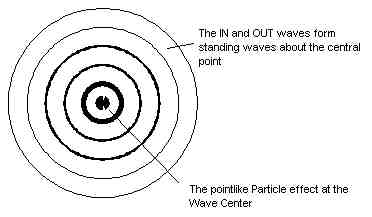 Given
that we all experience many minds and many material objects, but always
in one common space, thus to abide by science (empiricism / simplicity)
we have no choice but to describe reality in terms of space.
Given
that we all experience many minds and many material objects, but always
in one common space, thus to abide by science (empiricism / simplicity)
we have no choice but to describe reality in terms of space.
From here it is easy to show that there is only one solution, a wave structure
of matter in Space. i.e. Space is a substance with the properties of a continuously
connected wave medium and matter is formed from spherical wave motions of
this space (thus explaining Aristotle's property of activity / motion as
being caused by the wave motion of Space).
Note: the diagram's circles are a two dimensional representation of three dimensional spheres / four dimensional spherical waves.
And I do realise that this may seem radical to people brought up with particle concepts of matter (as I was), yet physics itself tells us that matter is a large structure of space, as required by Einstein's general relativity and quantum physics.
Further we see that this solution satisfies the rules of both metaphysics and science - while also correcting their errors (giving substance to science - empiricism to metaphysics).
Science
i) Simplicity / Occam's razor: We apply this to science itself to deduce
the most simple science theory of reality. This prevents us from describing
reality in terms of many discrete and separate things (matter 'particles').
ii) Empirical: We all experience existing in one common space.
iii) Logical: Waves / interconnected wave patterns behave logically.
Metaphysics
i) Substance: Only one substance exists, this space we all commonly experience
existing in.
ii) Causation and Necessary Connection: By describing reality in terms of
only one substance, space, we can easily understand how matter's spherical
in and out waves are necessarily interconnected with other matter in the
space around it. This is why you can see distant stars - your body is a
wave structure of the universe vibrating with all this other matter.
And hopefully it is now more clear to you this profundity of metaphysics - being central to: simplicity, unity, reality, necessary connection, causation, logic, knowledge, certainty, senses, science and truth.
The Error: Newton's Particles and Mathematical Physics
Once we have the correct solution it is easy to see where we made the error. We just have to go back to the time of Huygens (1629-1695), Newton (1642-1727) and Leibniz (1646-1716).
History shows that we took the path of Newton and tried to describe an inter-connected reality with many discrete and separate matter 'particles'. This then required mathematical relationships to connect the matter particles in space and time - where particles have 'mass' and are connected by 'forces' as per Newton's famous law of inertia F=m. a.
Effectively Newton (and mathematical physics) replaced a metaphysics of substance with a metaphysics of mathematics, where causal connection came from mathematical logic and axioms. However, this never explained causal connection and when they finally looked for the source of this they found that mathematics itself is incomplete (see Godel). As Dyson writes;
I am acutely aware of the fact that the marriage between mathematics and physics, which was so enormously fruitful in past centuries, has recently ended in divorce. ( Freeman John Dyson, Missed Opportunities)
Newton realised this lack of causal connection in his mechanics, he writes;
 It
is inconceivable that inanimate brute matter should, without mediation of
something else which is not matter, operate on and affect other matter without
mutual contact. ... That gravity should be innate, inherent and essential
to matter, so that one body may act upon another at-a-distance, through
a vacuum, without the mediation of anything else by and through which their
action may be conveyed from one to another, is to me so great an absurdity
that I believe no man, who has in philosophical matters a competent faculty
of thinking, can ever fall into it. So far I have explained the phenomena
by the force of gravity, but I have not yet ascertained the cause of gravity
itself. ... and I do not arbitrarily invent hypotheses. (Newton. Letter
to Richard Bentley 25 Feb. 1693)
It
is inconceivable that inanimate brute matter should, without mediation of
something else which is not matter, operate on and affect other matter without
mutual contact. ... That gravity should be innate, inherent and essential
to matter, so that one body may act upon another at-a-distance, through
a vacuum, without the mediation of anything else by and through which their
action may be conveyed from one to another, is to me so great an absurdity
that I believe no man, who has in philosophical matters a competent faculty
of thinking, can ever fall into it. So far I have explained the phenomena
by the force of gravity, but I have not yet ascertained the cause of gravity
itself. ... and I do not arbitrarily invent hypotheses. (Newton. Letter
to Richard Bentley 25 Feb. 1693)
Einstein confirms this;
 In
Newtonian physics the elementary theoretical concept on which the theoretical
description of material bodies is based is the material point, or particle.
Thus matter is considered a priori to be discontinuous. This makes it necessary
to consider the action of material points on one another as action-at-a-distance.
Since the latter concept seems quite contrary to everyday experience, it
is only natural that the contemporaries of Newton - and indeed Newton himself
- found it difficult to accept. Owing to the almost miraculous success of
the Newtonian system, however, the succeeding generations of physicists
became used to the idea of action-at-a-distance. Any doubt was buried for
a long time to come. (Albert Einstein, 1950)
In
Newtonian physics the elementary theoretical concept on which the theoretical
description of material bodies is based is the material point, or particle.
Thus matter is considered a priori to be discontinuous. This makes it necessary
to consider the action of material points on one another as action-at-a-distance.
Since the latter concept seems quite contrary to everyday experience, it
is only natural that the contemporaries of Newton - and indeed Newton himself
- found it difficult to accept. Owing to the almost miraculous success of
the Newtonian system, however, the succeeding generations of physicists
became used to the idea of action-at-a-distance. Any doubt was buried for
a long time to come. (Albert Einstein, 1950)
"When we attribute this strange attractive property to massive particles, aren't we indulging in metaphysics? For we are saying, indeed, that matter has a inner, active principle: matter attracts matter. At the time, physicists (who called themselves "natural philosophers") accused Newton of doing exactly that, indulging in metaphysics, and the followers of Descartes (mostly in France) couldn't stomach the law of gravitation. What can we say in Newton's defense? Well, surely he was indulging in metaphysics, but with a difference: he wasn't just saying, like others had been doing for centuries, that things have an inner, active principle and leaving it at that; he gave a mathematical law for that inner, active principle. That made a lot of difference. He abstained from answering the metaphysical question, "What is this attractive force?" Rather, he just gave a mathematical formula for it. Still, the main reason for the acceptance of Newton's gravitation was its tremendous success. As the saying goes, nothing succeeds like success." (Prof. Ricardo Nirenberg, 1997)
This is why mathematicians now seem so skeptical of Metaphysics as they use their mathematics to connect things instead. However, this has led to the creation of many different 'particles' to explain various matter interactions, and ultimately to a very confusing and paradoxical description of physical reality. Yet Mathematical physicists seem to ignore this, almost as if mathematics exists in some magical realm beyond reality! It does not - it exists in physical reality and depends upon it for its necessary connection. (The mathematical physics page explains how it is in fact waves that are the metaphysical foundation of both mathematics and matter.)
The correct path. Well we just had to combine the ideas of Huygens (waves), Leibniz's monadology (matter and universe are one interconnected thing) and Newton's Mechanics (space). From this we can deduce the correct substance (space) and its properties (a wave medium) as a partial solution to metaphysics (space may have more properties - I do not know).
Thus we simplify Newton's metaphysics from the motion of matter particles in space and time, to the wave motion of space that causes matter and time. i.e. From a metaphysics of Space and Time to a Metaphysics of Space and (wave) Motion. In this way we unite not only space and time but also matter and energy - as one connected thing, the wave motion of space that causes matter and time.
As a side note, this quote from Newton is interesting (if only he had applied it to his mechanics!)
"Truth is ever to be found in simplicity, and not in the multiplicity and confusion of things." (Isaac Newton)
Matter is a large structure of the universe (not a tiny 'particle'). A spherical wave structure where the wave center 'particle' is in continual two way communication with all other matter in the observable universe due to its spherical in and out waves. Thus we can now understand very simply and sensibly how one substance space (and its wave motions) is the ultimate foundation for causal connection of both physical reality and mathematical physics.
In ending, let us return to the start and consider why a ball falls to the earth. Well the wave equations tell us that the waves travel more slowly in higher energy density space (where there is more matter). Thus the spherical in waves that travel through the earth have a slower velocity than the waves coming in from the space above. This causes the wave center to re-position towards the center of the earth. We call this gravity - but now we can understand the true causal connection in physical reality (space) that causes this gravitational attraction.
Note: This is a very approximate diagram, just to show the idea of how the spherical in waves determine the future postion of the wave center (the motion of the particle). We have a page of wave diagrams that will help you visualise the spherical standing wave structure of matter (WSM) in space. Basically, we only see the high wave amplitude wave-center and have been deluded into thinking matter was made of tiny little 'particles'. A very naive conception in hindsight - and quantum physics was telling us all along that waves were central to light and matter interactions!
Metaphysics: Skepticism and Postmodernism
Some of the more significant reasons for this current skepticism of metaphysics are;
1. We must imagine how things are connected together - and this has led to a lot of fanciful nonsense being written because 'metaphysics is beyond our senses'.
Solution: The spherical in out waves explain this hidden causal connection of matter that is the cause of our senses. i.e. We only see the high wave amplitude wave center, not the spherical in and out waves, and this deceived us into thinking matter was a tiny 'particle'. Thus we were blind to how these discrete 'particles' were interconnected in space and had to invent 'forces / fields'.
2. Newton / mathematical physics replaced a metaphysics of substance with a metaphysics of mathematics, then discovered that our mathematical theories did not quite work (we could not unite quantum physics with Einstein's relativity) and that mathematics itself was without foundation.
Solution: Again the logical behavior of interconnected repeating wave patterns
explain the source of this mathematical logic, why this is so useful in
mathematical physics, while also simply uniting these two famous physics
theories.
3. These past failures of metaphysics have resulted in our postmodern world
where academics are convinced we cannot correctly imagine reality. Thus
all truth is cultural - socially informed constructs which are relative,
evolving approximations of reality. This has led to the extremely silly
and dangerous view that all truths are equal - just personal opinions really.
Solution: We all experience existing in one common space. This is a universal absolute truth. We can deduce how a spherical wave structure of matter must behave in this space and then show that this exactly matches how an electron behaves. This then explains and solves the central problems of physics. There is no opinion - this will be true for all people.
~~~~~~~~~
Conclusion: Once we have the correct metaphysical foundations for describing reality it is remarkably easy to solve the central problems of metaphysics and thus also physics and philosophy by understanding how matter exists and moves about in Space in a necessarily interconnected way. Please see articles on the side of this page.
Any comments / questions please post them below on Facebook
Connect. Thanks.
Geoff Haselhurst
Metaphysics Quotes: On Truth, Reality & Principles in Science
Aristotle Metaphysics
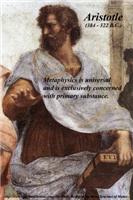 It
is clear, then, that wisdom is knowledge having to do with certain principles
and causes. But now, since it is this knowledge that we are seeking, we
must consider the following point: of what kind of principles and of what
kind of causes is wisdom the knowledge? (Aristotle, Metaphysics,
340BC)
It
is clear, then, that wisdom is knowledge having to do with certain principles
and causes. But now, since it is this knowledge that we are seeking, we
must consider the following point: of what kind of principles and of what
kind of causes is wisdom the knowledge? (Aristotle, Metaphysics,
340BC)
Metaphysics involves intuitive knowledge of unprovable starting-points (concepts and truth) and demonstrative knowledge of what follows from them. (Aristotle, Metaphysics, 340BC)
Demonstration is also something necessary, because a demonstration cannot go otherwise than it does, ... And the cause of this lies with the primary premises/principles. (Aristotle, Metaphysics)
The first philosophy (Metaphysics) is universal and is exclusively concerned with primary substance. ... And here we will have the science to study that which is just as that which is, both in its essence and in the properties which, just as a thing that is, it has. (Aristotle, Metaphysics, 340BC)
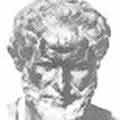 The
entire preoccupation of the physicist is with things that contain within
themselves a principle of movement and rest. And to seek for this is to
seek for the second kind of principle, that from which comes the beginning
of the change. (Aristotle, Metaphysics, 340BC)
The
entire preoccupation of the physicist is with things that contain within
themselves a principle of movement and rest. And to seek for this is to
seek for the second kind of principle, that from which comes the beginning
of the change. (Aristotle, Metaphysics, 340BC)
There must then be a principle of such a kind that its substance
is activity.
... it is impossible that the primary existent, being eternal, should be
destroyed.
... that among entities there must be some cause which
moves and combines things.
... about its coming into being and its doings and about all its alterations
we think that we have knowledge when we know the source of its movement.
(Aristotle, Metaphysics, 340BC)
For those who wish to make good progress must start well; for subsequent progress depends on the resolution of the first puzzles, and one cannot solve these without knowing the difficulty and the confusion of our minds. So we must first set out all the difficulties, both for these reasons and also because those who inquire without first setting out the difficulties are like those who do not know in which direction they should walk, and in addition do not even know whether they would recognize that which they are looking for. For the end is not clear to these, but it is for those who have begun with the puzzles. And also from the point of view of judging that man is better off who has heard, as it were, all the rival and opposed positions. (Aristotle, Metaphysics)
Gottfried Leibniz on Metaphysics (Monadology)

(Gottfried Leibniz, 1670)
Reality cannot be found except in One single source, because of the interconnection of all things with one another. ... I maintain also that substances, whether material or immaterial, cannot be conceived in their bare essence without any activity, activity being of the essence of substance in general. (Leibniz, 1670)
It is a good thing to proceed in order and to establish propositions (principles). This is the way to gain ground and to progress with certainty. ... I hold that the mark of a genuine idea is that its possibility can be proved, either a priori by conceiving its cause or reason, or a posteriori when experience teaches us that it is a fact in nature.
Indeed in general I hold that there is nothing truer than happiness, and nothing happier and sweeter than truth. (Leibniz, 1670)
I agree with you that it is important to examine our presuppositions, thoroughly and once for all, in order to establish something solid. For I hold that it is only when we can prove all that we bring forward that we perfectly understand the thing under consideration. I know that the common herd takes little pleasure in these researches, but I know also that the common herd take little pains thoroughly to understand things. (Leibniz, 1670)
 ...
a distinction must be made between true and false ideas, and that too much
rein must not be given to a man's imagination under pretext of its being
a clear and distinct intellection. (Leibniz, 1670)
...
a distinction must be made between true and false ideas, and that too much
rein must not be given to a man's imagination under pretext of its being
a clear and distinct intellection. (Leibniz, 1670)
But it is the knowledge of necessary and eternal truths which distinguishes us from mere animals, and gives us reason and the sciences, raising us to knowledge of ourselves and God. It is this in us which we call the rational soul or mind. (Leibniz, 1670)
When a truth is necessary, the reason for it can be found by analysis, that is, by resolving it into simpler ideas and truths until the primary ones are reached. It is this way that in mathematics speculative theorems and practical canons are reduced by analysis to definitions, axioms and postulates. (Leibniz, 1670)
David Hume Metaphysics Quotes: On Causation / Necessary Connection
 It
must certainly be allowed, that nature has kept us at a great distance from
all her secrets, and has afforded us only the knowledge of a few superficial
qualities of objects; while she conceals from us those powers and principles
on which the influence of those objects entirely depends. (Hume,
1737)
It
must certainly be allowed, that nature has kept us at a great distance from
all her secrets, and has afforded us only the knowledge of a few superficial
qualities of objects; while she conceals from us those powers and principles
on which the influence of those objects entirely depends. (Hume,
1737)
When we look about us towards external objects, and consider the operation of causes, we are never able, in a single instance, to discover any power or necessary connexion; any quality, which binds the effect to the cause, and renders the one an infallible consequence of the other. (Hume, 1737)
... experience only teaches us, how one event constantly follows another; without instructing us in the secret connexion, which binds them together, and renders them inseparable. (Hume, 1737)
We then call the one object, Cause; the other, Effect. We suppose that there is some connexion between them; some power in the one, by which it infallibly produces the other, and operates with the greatest certainty and strongest necessity. (Hume, 1737)
Immanuel Kant Quotes on Metaphysics
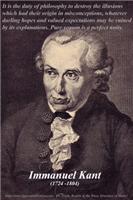 Time
was, when she (Metaphysics) was the queen of all the sciences; and, if we
take the will for the deed, she certainly deserves, so far as regards the
high importance of her object-matter, this title of honour. Now, it is the
fashion of the time to heap contempt and scorn upon her; and the matron
mourns, forlorn and forsaken, like Hecuba .. her empire gradually broke
up, and intestine wars introduced the reign of anarchy; while the sceptics,
like nomadic tribes, who hate a permanent habitation and settled mode of
living, attacked from time to time those who had organized themselves into
civil communities. But their number was, very happily, small; and thus they
could not entirely put a stop to the exertions of those who persisted in
raising new edifices, although on no settled or uniform plan. (Immanuel
Kant, Critique of Pure Reason, 1781)
Time
was, when she (Metaphysics) was the queen of all the sciences; and, if we
take the will for the deed, she certainly deserves, so far as regards the
high importance of her object-matter, this title of honour. Now, it is the
fashion of the time to heap contempt and scorn upon her; and the matron
mourns, forlorn and forsaken, like Hecuba .. her empire gradually broke
up, and intestine wars introduced the reign of anarchy; while the sceptics,
like nomadic tribes, who hate a permanent habitation and settled mode of
living, attacked from time to time those who had organized themselves into
civil communities. But their number was, very happily, small; and thus they
could not entirely put a stop to the exertions of those who persisted in
raising new edifices, although on no settled or uniform plan. (Immanuel
Kant, Critique of Pure Reason, 1781)
This can never become popular, and, indeed, has no occasion to be so; for fine-spun arguments in favour of useful truths make just as little impression on the public mind as the equally subtle objections brought against these truths. On the other hand, since both inevitably force themselves on every man who rises to the height of speculation, it becomes the manifest duty of the schools to enter upon a thorough investigation of the rights of speculative reason, and thus to prevent the scandal which metaphysical controversies are sure, sooner or later, to cause even to the masses. (Immanuel Kant, Critique of Pure Reason, 1781)
Albert Einstein on Principles in Physics
Note: This is a summary from the main Principles in Physics page (which is very good).
All logic depends upon Principles which gives rise to necessary consequences that are absolute and certain (rather than mere opinions). The aim of Science is to demonstrate that these logical deductions from (a priori) Principles exactly correspond with our sense of the real world from (a posteriori) observation and experiment. Albert Einstein explains this Scientific method very clearly;
 (Albert Einstein) Physics constitutes a logical system
of thought which is in a state of evolution, whose basis (principles) cannot
be distilled, as it were, from experience by an inductive method, but can
only be arrived at by free invention. The justification (truth content)
of the system rests in the verification of the derived propositions (a
priori/logical truths) by sense experiences (a posteriori/empirical
truths). ... Evolution is proceeding in the direction of increasing simplicity
of the logical basis (principles). .. We must always be ready to change
these notions - that is to say, the axiomatic basis of physics - in order
to do justice to perceived facts in the most perfect way logically. (Albert
Einstein, Physics and Reality, 1936)
(Albert Einstein) Physics constitutes a logical system
of thought which is in a state of evolution, whose basis (principles) cannot
be distilled, as it were, from experience by an inductive method, but can
only be arrived at by free invention. The justification (truth content)
of the system rests in the verification of the derived propositions (a
priori/logical truths) by sense experiences (a posteriori/empirical
truths). ... Evolution is proceeding in the direction of increasing simplicity
of the logical basis (principles). .. We must always be ready to change
these notions - that is to say, the axiomatic basis of physics - in order
to do justice to perceived facts in the most perfect way logically. (Albert
Einstein, Physics and Reality, 1936)
The development during the present century is characterized by two theoretical systems essentially independent of each other: the theory of relativity and the quantum theory. The two systems do not directly contradict each other; but they seem little adapted to fusion into one unified theory. For the time being we have to admit that we do not possess any general theoretical basis for physics which can be regarded as its logical foundation. (Albert Einstein, 1940)
If, then, it is true that the axiomatic basis of theoretical physics cannot be extracted from experience but must be freely invented, can we ever hope to find the right way? I answer without hesitation that there is, in my opinion, a right way, and that we are capable of finding it. I hold it true that pure thought can grasp reality, as the ancients dreamed. (Albert Einstein, 1954)
Albert Einstein Quotes on Metaphysics
(Remarks on Bertrand Russell's Theory of Knowledge, 1954)
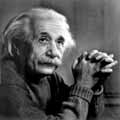 In the evolution of philosophical thought
through the centuries the following question has played a major role: what
knowledge is pure thought able to supply independently of sense perception?
Is there any such knowledge? If not, what precisely is the relation between
our knowledge and the raw material furnished by sense impressions?
In the evolution of philosophical thought
through the centuries the following question has played a major role: what
knowledge is pure thought able to supply independently of sense perception?
Is there any such knowledge? If not, what precisely is the relation between
our knowledge and the raw material furnished by sense impressions?
There has been an increasing skepticism concerning every
attempt by means of pure thought to learn something about the 'objective
world', about the world of 'things' in contrast to the
world of 'concepts and ideas'. During philosophy's childhood
it was rather generally believed that it is possible to find everything
which can be known by means of mere reflection. It was an illusion
which anyone can easily understand if, for a moment, he dismisses what he
has learned from later philosophy and from natural science; he will not
be surprised to find that Plato ascribed a higher reality
to 'ideas' than to empirically experienceable things. Even in Spinoza and
as late as in Hegel this prejudice was the vitalising force which seems
still to have played the major role.
The more aristocratic illusion concerning the unlimited penetrative power
of thought has as its counterpart the more plebeian illusion of naive
realism, according to which things 'are' as they are perceived
by us through our senses. This illusion dominates the daily life of men
and of animals; it is also the point of departure in all of the sciences,
especially of the natural sciences.
As Russell wrote;
'We all start from naive realism, i.e., the doctrine that things are what they seem. We think that grass is green, that stones are hard, and that snow is cold. But physics assures us that the greenness of grass, the hardness of stones, and the coldness of snow are not the greenness, hardness, and coldness that we know in our own experience, but something very different. The observer, when he seems to himself to be observing a stone, is really, if physics is to be believed, observing the effects of the stone upon himself.'
Gradually the conviction gained recognition that all knowledge about things is exclusively a working-over of the raw material furnished by the senses. Galileo and Hume first upheld this principle with full clarity and decisiveness. Hume saw that concepts which we must regard as essential, such as, for example, causal connection, cannot be gained from material given to us by the senses. This insight led him to a skeptical attitude as concerns knowledge of any kind. Man has an intense desire for assured knowledge. That is why Hume's clear message seemed crushing: the sensory raw material, the only source of our knowledge,through habit may lead us to belief and expectation but not to the knowledge and still less to the understanding of lawful relations.
Then Kant took the stage with an idea which, though certainly untenable in the form in which he put it, signified a step towards the solution of Hume's dilemma: whatever in knowledge is of empirical origin is never certain. If, therefore, we have definitely assured knowledge,it must be grounded in reason itself. This is held to be the case, for example, in the propositions of geometry and the principles of causality. These and certain other types of knowledge are, so to speak, a part of the implements of thinking and therefore do not previously have to be gained from sense data (i.e. they are a priori knowledge).
 Today
everyone knows, of course, that the mentioned concepts contain nothing of
the certainty, of the inherent necessity, which Kant had attributed to them.
The following, however, appears to me to be correct in Kant's statement
of the problem: in thinking we use with a certain "right", concepts
to which there is no access from the materials of sensory experience, if
the situation is viewed from the logical point of view. As a matter of fact,
I am convinced that even much more is to be asserted: the concepts which
arise in our thought and in our linguistic expressions are all- when viewed
logically- the free creations of thought which cannot inductively
be gained from sense experiences. This is not so easily
noticed only because we have the habit of combining certain concepts and
conceptual relations (propositions) so definitely with certain sense experiences
that we do not become conscious of the gulf- logically unbridgeable- which
separates the world of sensory experiences from the world of concepts and
propositions. Thus, for example, the series of integers is obviously an
invention of the human mind, a self-created tool which simplifies the ordering
of certain sensory experiences. But there is no way in which this concept
could be made to grow, as it were, directly out of sense experiences.
Today
everyone knows, of course, that the mentioned concepts contain nothing of
the certainty, of the inherent necessity, which Kant had attributed to them.
The following, however, appears to me to be correct in Kant's statement
of the problem: in thinking we use with a certain "right", concepts
to which there is no access from the materials of sensory experience, if
the situation is viewed from the logical point of view. As a matter of fact,
I am convinced that even much more is to be asserted: the concepts which
arise in our thought and in our linguistic expressions are all- when viewed
logically- the free creations of thought which cannot inductively
be gained from sense experiences. This is not so easily
noticed only because we have the habit of combining certain concepts and
conceptual relations (propositions) so definitely with certain sense experiences
that we do not become conscious of the gulf- logically unbridgeable- which
separates the world of sensory experiences from the world of concepts and
propositions. Thus, for example, the series of integers is obviously an
invention of the human mind, a self-created tool which simplifies the ordering
of certain sensory experiences. But there is no way in which this concept
could be made to grow, as it were, directly out of sense experiences.
As soon as one is at home in Hume's critique one is easily
led to believe that all those concepts and propositions which cannot be
deduced from the sensory raw material are, on account of their 'metaphysical'
character, to be removed from thinking. For all thought acquires material
content only through its relationship with that sensory material. This latter
proposition I take to be entirely true; but I hold the prescription for
thinking which is grounded on this proposition to be false. For this claim-
if only carried through consistently- absolutely excludes thinking of any
kind as 'metaphysical'.
In order that thinking might not degenerate into 'metaphysics', or into
empty talk, it is only necessary that enough propositions of the conceptual
system be firmly enough connected with sensory experiences and that the
conceptual system, in view of its task of ordering and surveying sense experience,
should show as much unity and parsimony as possible. Beyond
that, however, the 'system' is (as regards logic) a free play with symbols
according to (logically) arbitrarily given rules of the game. All this applies
as much (and in the same manner) to the thinking in daily life as to the
more consciously and systematically constructed thinking in the sciences.
By his clear critique Hume did not only
advance philosophy in a decisive way but also - though through no fault
of his - created a danger for philosophy in that, following his critique,
a fateful 'fear of metaphysics' arose which has come to
be a malady of contemporary empiricist philosophising;
this malady is the counterpart to that earlier philosophising in the clouds,
which thought it could neglect and dispense with what was given by the senses.
... It finally turns out that one can, after all, not get along
without metaphysics.
(Albert Einstein, Remarks on Bertrand Russell's Theory
of Knowledge, Ideas and Opinions, 1954)
Help Humanity
"You must be the change you wish to see in the world."
(Mohandas Gandhi)
 "When forced to summarize the general theory of relativity in one sentence:
Time and space and gravitation have no separate existence from matter. ... Physical objects are not in space, but these objects are spatially extended. In this way the concept 'empty space' loses its meaning. ... The particle can only appear as a limited region in space in which
the field strength or the energy density are particularly high. ...
"When forced to summarize the general theory of relativity in one sentence:
Time and space and gravitation have no separate existence from matter. ... Physical objects are not in space, but these objects are spatially extended. In this way the concept 'empty space' loses its meaning. ... The particle can only appear as a limited region in space in which
the field strength or the energy density are particularly high. ...
The free, unhampered exchange of ideas and scientific conclusions is necessary for the sound development of science, as it is in all spheres
of cultural life. ... We must not conceal from ourselves that no improvement in the present depressing situation is possible without
a severe struggle; for the handful of those who are really determined to do something is minute in comparison with the mass of the lukewarm
and the misguided. ...
Humanity is going to need a substantially new way of thinking if it is to survive!" (Albert Einstein)
 We can now deduce the most simple science theory of reality - the wave structure of matter in space. By understanding how we and everything around us are interconnected
in Space we can then deduce solutions to the fundamental problems of human knowledge in physics, philosophy, metaphysics, theology, education, health, evolution and ecology, politics and society.
We can now deduce the most simple science theory of reality - the wave structure of matter in space. By understanding how we and everything around us are interconnected
in Space we can then deduce solutions to the fundamental problems of human knowledge in physics, philosophy, metaphysics, theology, education, health, evolution and ecology, politics and society.
This is the profound new way of thinking that Einstein
realised, that we exist as spatially extended structures of the universe - the discrete and separate body an illusion. This simply confirms the
intuitions of the ancient philosophers and mystics.
Given the current censorship in physics / philosophy of science journals (based on the standard model of particle physics / big bang cosmology) the internet is the best hope for getting new knowledge
known to the world. But that depends on you, the people who care about science and society, realise the importance of truth and reality.
It is Easy to Help!
Just click on the Social Network links at top of page, or copy a nice image or quote you like and share it. We have a wonderful collection of knowledge from the greatest minds in human history, so people will appreciate your contributions. In doing this you will help a new generation of scientists see that there is a simple sensible explanation of physical reality (One Substance, One Law) - the source of truth and wisdom, the only cure for the madness of man! Thanks! Geoff Haselhurst (Updated May, 2025)
A new scientific truth does not triumph by convincing its opponents and making them see the light, but rather because its opponents eventually die, and a new generation grows up that is familiar with it. (Max Planck, 1920)
"All that is necessary for evil to succeed is for good people to do nothing."
(Edmund Burke)
"In a time of universal deceit - telling the truth is a revolutionary act."
(George Orwell)
"Hell is Truth Seen Too Late."
(Thomas Hobbes)
Legal Disclaimer and Privacy Policy












